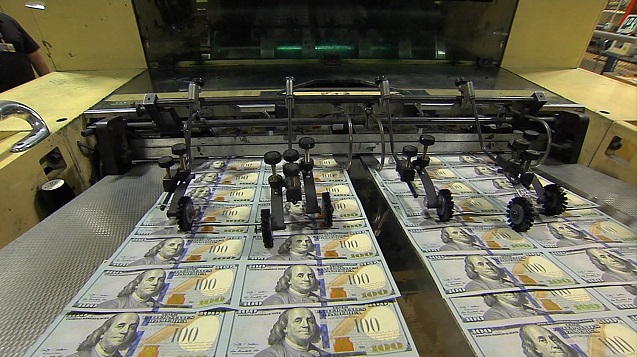
Support justice-driven, accurate and transparent news — make a quick donation to Truthout today!
Oh, dear. I’m starting to notice a shift in the scare talk. Cries that “We’re about to turn into Greece, Greece, I tell you,” are getting a bit fainter, maybe because of what I’ve been writing in response. But taking their place are dire warnings that the dollar’s role as a reserve currency is endangered.
Urk.
People who talk like this generally have no idea what they are saying — that is, they have no idea what the dollar’s role really is, what might endanger that role, and why it matters (to the extent that it does). In fact, I’d suggest that any extended economic discussion usually ends up with people invoking the need to defend the dollar’s international role — which is in effect a concession that they’ve lost the rest of the argument.
So, what is the dollar’s international role? It is, in a sense, to other currencies what money is to other assets, filling to some extent the classic three functions of medium of exchange, unit of account and store of value. In talking about these roles we should also distinguish between the dollar’s role in private decisions and its role in official actions. So we get a matrix that looks like the one in the box on this page.
The dollar is, first of all, a vehicle currency (mainly in the interbank market): If a bank wants to convert bolivars into zlotys, it will generally trade the bolivars for dollars, then the dollars for zlotys, rather than try to find someone wanting to make the reverse trade.
It is the currency many, though by no means all, international transactions are invoiced in. And to some extent many people hold dollars or dollar-denominated assets because the dollar is more liquid than other currencies.
Meanwhile, governments trying to prop up their currencies or hold them down often do so with trades against the dollar, even if they’re trying to affect some other exchange rate. Some countries peg their currencies to the dollar, although not too many these days. And governments hold dollar-denominated reserves.
To some extent the dollar’s role here reflects self-sustaining increasing returns: People use dollars because the markets are thicker (many buyers and sellers) and more liquid, and the markets are thicker and more liquid because people use dollars. The circular nature of this position also arguably means that historical accident matters: The pound remained the world’s leading currency long after Britain had ceased to be the world’s leading economy (although Britain did do a lot of trade, so the case isn’t actually all that clear.)
The same factor suggests that a temporary period of inflation or instability could dethrone the dollar more or less permanently. But is this something Americans should worry about?
First of all, it’s hard to argue that any currency really poses a threat to the dollar. That would require free movement of capital — which rules out the renminbi for now — and deep financial markets. The euro used to look like a viable alternative, but its bond markets are now fragmented along national lines, which makes it much less plausible. But even if the dollar loses some of its dominance, why should Americans get bent out of shape? There is no evidence that the United States is able to borrow at dramatically lower rates because of the dollar’s role (and, anyway, more foreign borrowing is not necessarily a good thing.)
I often hear claims that the country has only been able to run persistent trade deficits because of the dollar’s special role; this is just false, since other countries like Britain and Australia have been able to do the same thing. What is true is that the large holdings of American currency outside the United States — largely in the form of $100 bills, held for obvious reasons — represent, in effect, a roughly $500 billion zero-interest loan to America.
That’s nice, but even in normal times it’s only worth around $20 billion a year, or roughly 0.15 percent of the nation’s gross domestic product. And anyway, the euro has done well on that front too. If you like, South American drug lords hold dollars, Russian beeznessmen hold euros, and in both cases these are trivial subsidies to rich, huge economies.
The bottom line is that while saying “the international role of the dollar” sounds very sophisticated and important, the more you know about all this, the less you care. This is simply not a big deal.
Media that fights fascism
Truthout is funded almost entirely by readers — that’s why we can speak truth to power and cut against the mainstream narrative. But independent journalists at Truthout face mounting political repression under Trump.
We rely on your support to survive McCarthyist censorship. Please make a tax-deductible one-time or monthly donation.